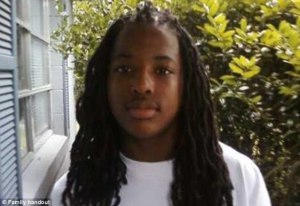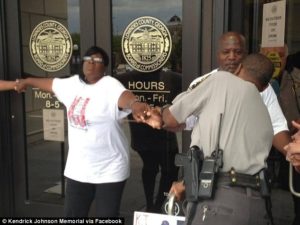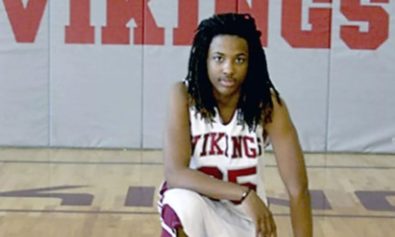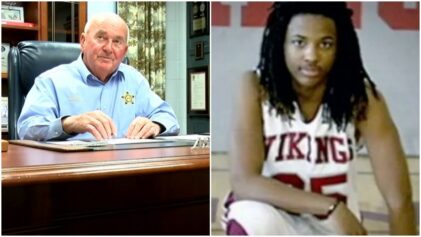As Kendrick Johnson’s parents press for answers in the death of their son, they will now have to face another possible challenge in the midst of their mourning: possible jail time.
Kenneth and Jacquelyn Johnson have been steadfast in their refusal to accept the highly dubious official explanation for their 17-year-old son’s death in January 2013, when he was found dead inside a rolled up gym mat at Lowndes High School in Valdosta. Now they must appear in a Lowndes County court today facing misdemeanor charges for an April 2013 protest during which they blocked the entrance to the Lowndes County Courthouse in Valdosta, Georgia, and blocked access to the security checkpoint inside the building.
While they engineered the protest to call attention to their son’s case, it would be the height of outrage and disrespect if they are forced to serve time in jail.
The YouTube video of the protest shows the family members, who call themselves the “KJ 7,” being arrested as they hold hands and block the door to the courthouse. At the start of the video, one of their supporters, George Boston Rhynes—who has been assiduously documenting the case on a Youtube challenge and in a blog—explains that they will be provoking the arrest in an act of civil disobedience, a time-honored tradition in protest movements to bring media attention to a cause and to express outrage.
They are holding signs with messages such as “What If Kendrick Johnson Was Ur Child?” and “No Justice, No Peace.” At first there is no reaction from authorities, but after they lock hands and prevent white people from entering or exiting the building, then authorities tell them if they don’t move they will be arrested. When they refuse to move, the deputies forcefully pull their hands apart and bring Kendrick’s father, Kenneth Johnson, inside to arrest them along with another family member.
After her husband is brought inside the courthouse, on the video Jacquelyn Johnson sends out a warning to other parents at Lowndes High School. “Murderers are running around loose in that school. They should be afraid,” she says. “Whoever did this to my child, they done gave them a permit to kill. Because that’s what they did. Ain’t no way around it.”
She then locks hands with other family members to block the entrance to the security checkpoint inside, eventually forcing authorities to arrest them as well—as onlookers shout “No Justice, No Peace.”

“We know who killed him. We just have to prove it,” she said.
The civil suit was filed in Superior Court in metro Atlanta’s DeKalb County. Johnson’s parents pulled so many people into the suit because they believe all those people were involved in a massive conspiracy to cover up the death of their son.
“Defendants from the various law enforcement agencies deliberately and maliciously mishandled the subject investigation in such a way that anyone who might ever be charged with Kendrick’s death would never be convicted,” the lawsuit says.
In response to the suit, Lowndes County Attorney Jim Elliot said the allegations were “unfounded” and they would adddress the “baseless accusations” in court.
Out of all the cases of Black youth being killed in the last couple of years, Johnson’s is one of the most confounding and frustrating. Though it’s been almost exactly two years since his body was found on Jan. 11, 2013, new pieces of evidence keep appearing to cast doubt on the official story that he somehow fell head first into an upright mat and became trapped.
The family insisted that Johnson’s death was no accident and an independent autopsy report backed those beliefs.
From the beginning, the events leading up to the discovery of the dead teen made media headlines after key security footage was nowhere to be found and the official explanation for the teen’s death just didn’t add up.


